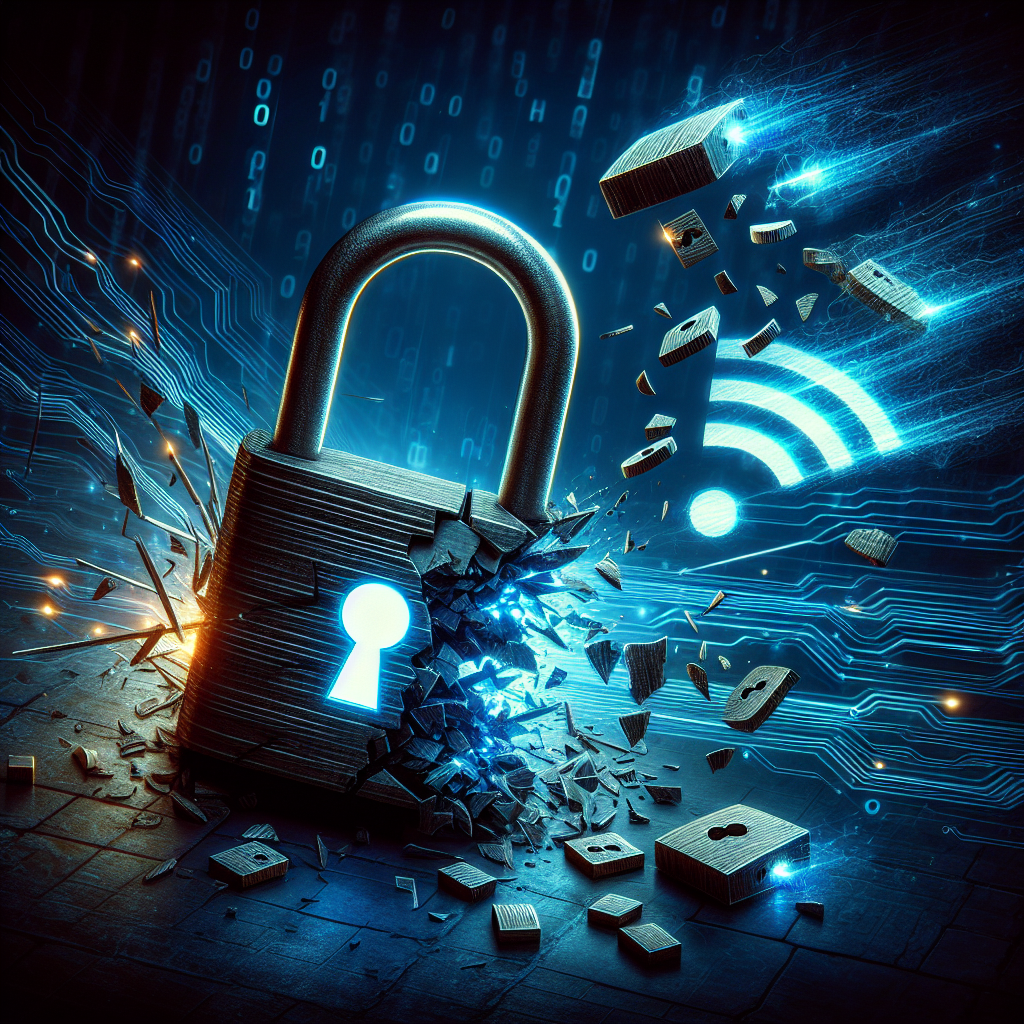In today’s digital age, it has become increasingly convenient to conduct transactions on the go, including crypto transactions. However, when it comes to using public Wi-Fi for such activities, a whole host of potential dangers lurk just beneath the surface. From hackers intercepting your sensitive information to the risks of malware and phishing attacks, the hazards of using public Wi-Fi for crypto transactions cannot be overlooked. But fret not, dear reader, as this article will delve into these dangers and equip you with essential tips to ensure your digital currency remains safe and secure. So, sit back, grab a cup of coffee, and let’s explore the risks associated with using public Wi-Fi for your crypto transactions.

1. Security Risks
1.1 Snooping
One of the major security risks associated with using public Wi-Fi for crypto transactions is snooping. When you connect to a public Wi-Fi network, your data is essentially transmitted through the airwaves. This means that anyone within the range of the network can potentially intercept and view your sensitive information. Hackers with malicious intent can use various techniques to eavesdrop on your connection and steal your valuable crypto assets. It is important to be aware that your financial transactions may be vulnerable to snooping on public Wi-Fi networks.
1.2 Man-in-the-middle Attacks
Another security risk when using public Wi-Fi for crypto transactions is man-in-the-middle attacks. In this type of attack, a hacker intercepts the communication between you and the intended recipient of your transaction. The hacker can then manipulate the communication, potentially altering the transaction details or redirecting it to their own account. This can lead to significant financial losses and compromise the integrity of your crypto transactions. Man-in-the-middle attacks are particularly dangerous in public Wi-Fi environments where there is a higher likelihood of unsecured connections.
1.3 Malware
Malware poses a serious threat when using public Wi-Fi for crypto transactions. Hackers often use malware to gain unauthorized access to your device and steal sensitive information such as passwords, private keys, and wallet information. Once they have access to your device, they can potentially control it remotely and carry out malicious activities without your knowledge. It is crucial to have up-to-date antivirus software and to be cautious when downloading files or visiting websites while connected to public Wi-Fi networks.
1.4 Shoulder Surfing
Shoulder surfing is a less sophisticated but still significant security risk associated with using public Wi-Fi for crypto transactions. It involves someone physically looking over your shoulder to obtain confidential information, such as your crypto wallet address or login credentials. Public Wi-Fi environments are often crowded with people, making it easier for someone to casually glance at your screen and gain access to your sensitive data. Practicing screen privacy and being mindful of your surroundings can help mitigate the risk of shoulder surfing.
2. Data Interception
2.1 Unencrypted Connections
Using unencrypted connections on public Wi-Fi networks exposes your data to interception and potential theft. When your data is transmitted without encryption, it becomes easily accessible to hackers who are monitoring the network. They can intercept your sensitive information, including your crypto wallet address, transaction details, and even your login credentials. Always ensure that you are using secure and encrypted connections, such as HTTPS, when engaging in crypto transactions on public Wi-Fi networks.
2.2 Fake Wi-Fi Networks
Fake Wi-Fi networks, also known as rogue access points, are designed to trick users into connecting to them. These networks are set up by hackers to resemble legitimate public Wi-Fi networks, but they are designed to capture and steal your data. When you connect to a fake Wi-Fi network, the hacker can intercept your crypto transactions and gain access to your sensitive information. It is crucial to verify the legitimacy of the public Wi-Fi network you are connecting to and avoid connecting to any suspicious or untrusted networks.
3. Phishing Attacks
3.1 Fake Websites
Phishing attacks involve tricking users into providing their sensitive information by posing as a trustworthy entity. Hackers often create fake websites that mimic popular cryptocurrency exchanges or wallet providers. When you enter your login credentials or wallet information on these fake websites, the hackers can capture your data and gain unauthorized access to your crypto assets. Be vigilant and double-check the website’s URL and security indicators to ensure you are on the legitimate website before entering any confidential information.
3.2 Credential Theft
In addition to fake websites, hackers can also employ tactics to steal your login credentials through phishing attacks. They may send you fraudulent emails or messages that appear to be from a legitimate cryptocurrency service provider, asking you to verify your account details or reset your password. When you click on the provided links and enter your information, the hackers can capture your credentials and use them to gain unauthorized access to your crypto assets. Always be cautious of such requests and verify the legitimacy of any messages you receive.
3.3 Social Engineering
Social engineering is a technique used by hackers to manipulate individuals into revealing sensitive information or performing actions that could compromise their security. In the context of public Wi-Fi and crypto transactions, hackers may approach you posing as technical support personnel or fellow users facing connectivity issues. They may seek to gain your trust and convince you to provide them with your login credentials or other confidential information. It is essential to be skeptical and avoid sharing any sensitive information or performing any actions requested by individuals you do not know or trust.
4. Keylogging
Keylogging refers to the method hackers use to record every keystroke you make on your device, including your login credentials and other sensitive information. This is often achieved through the installation of malicious software without your knowledge. When using public Wi-Fi for crypto transactions, if your device is infected with keylogging malware, hackers can capture your sensitive information and gain unauthorized access to your crypto assets. To protect yourself from keyloggers, it is crucial to keep your antivirus software up to date and avoid downloading files from untrusted sources.

5. Unauthorized Access
5.1 Weak Passwords
Using weak passwords for your crypto wallet or exchange accounts can lead to unauthorized access and potential theft of your assets. Hackers often use automated tools to guess weak passwords, and once they gain access, they can transfer your funds to their own accounts. To protect yourself, ensure that you create strong, unique passwords that include a combination of uppercase and lowercase letters, numbers, and special characters. Additionally, consider using a password management tool to securely store and generate complex passwords for your crypto accounts.
5.2 Network Vulnerabilities
Public Wi-Fi networks may have inherent vulnerabilities that hackers can exploit to gain unauthorized access to your device. These vulnerabilities can include outdated or unpatched network equipment, weak encryption protocols, or misconfigured security settings. Hackers can take advantage of these weaknesses to infiltrate the network and compromise your device’s security. To mitigate the risk of network vulnerabilities, it is essential to keep your devices updated with the latest security patches and use additional layers of security, such as a firewall or virtual private network (VPN).
6. Lack of Trustworthiness
6.1 Unsecured Wi-Fi Hotspots
Public Wi-Fi hotspots, especially those that are unsecured or do not require any authentication, are inherently less trustworthy. Hackers can set up malicious Wi-Fi hotspots with names similar to legitimate networks in order to trick users into connecting to them. These unsecured hotspots provide a breeding ground for various security risks, including snooping, data interception, and unauthorized access. It is important to exercise caution and verify the legitimacy of the Wi-Fi hotspot you are connecting to before transmitting any sensitive information.
6.2 Rogue Wi-Fi Networks
Rogue Wi-Fi networks are created by hackers with the intention of intercepting and stealing users’ data. These networks often mimic legitimate hotspots, making it difficult for users to differentiate between the two. When connecting to a rogue Wi-Fi network, hackers can capture your crypto transactions, gain access to your private keys, and potentially compromise the security of your crypto assets. To minimize the risk of falling victim to rogue Wi-Fi networks, always verify the authenticity of the network before connecting and avoid using untrusted networks.
7. Lack of Privacy
7.1 Data Tracking
Public Wi-Fi networks are often monitored and tracked by various entities, including service providers, advertisers, and even hackers. This lack of privacy exposes your online activities, including your crypto transactions, to potential scrutiny and data tracking. Hackers can analyze your browsing patterns and transaction history to gain insights into your financial activities and potentially target you for malicious purposes. To protect your privacy, consider using a virtual private network (VPN) to encrypt your internet traffic and shield your online activities from prying eyes.
7.2 Identity Theft
Identity theft is a grave concern when using public Wi-Fi for crypto transactions. Hackers can use the information they gather from your online activities, such as your email address, passwords, and transaction details, to impersonate you or carry out fraudulent activities in your name. This can have devastating consequences, both financially and personally. To mitigate the risk of identity theft, it is crucial to adopt security measures such as enabling two-factor authentication (2FA), regularly monitoring your accounts for suspicious activity, and using strong, unique passwords.
8. Malicious Software Distribution
Public Wi-Fi networks are notorious breeding grounds for the distribution of malicious software. When you connect to an untrusted network, your device becomes more susceptible to malware infections. Hackers can leverage these infections to gain unauthorized access to your device, steal your sensitive information, and even manipulate your crypto transactions. It is imperative to exercise caution when using public Wi-Fi and avoid downloading files or clicking on suspicious links that may lead to the installation of malware. Keeping your device’s antivirus software up to date is also essential to protect against known threats.
9. Public Wi-Fi Environment
9.1 Crowded Networks
Public Wi-Fi networks, especially in popular locations such as cafes, airports, or shopping centers, tend to be crowded with users. The high density of users on these networks can lead to congestion and potential performance issues. Under such conditions, your crypto transactions can be delayed or disrupted, increasing the risk of errors or even financial losses. It is advisable to exercise patience and consider alternative means of connectivity, such as using your mobile data or a personal hotspot, in order to ensure a more reliable and secure environment for your crypto transactions.
9.2 Inadequate Security Measures
Public Wi-Fi networks may lack adequate security measures, leaving your crypto transactions vulnerable to various risks. These networks often prioritize convenience over security, which can expose your sensitive information to unauthorized access or interception. To mitigate this risk, consider using additional security measures such as a virtual private network (VPN) to encrypt your connection or using a cellular network instead of public Wi-Fi for your crypto transactions. These measures add an extra layer of security and mitigate the vulnerabilities associated with public Wi-Fi networks.
10. Mitigating the Risks
10.1 Using a VPN
One of the most effective ways to mitigate the risks associated with using public Wi-Fi for crypto transactions is to use a virtual private network (VPN). A VPN encrypts your internet traffic, making it much more difficult for hackers to intercept and decipher your sensitive information. By routing your connection through a secure server, a VPN creates a secure tunnel that protects your data from snooping, man-in-the-middle attacks, and other security risks. It is important to choose a reputable and trustworthy VPN provider to ensure the effectiveness and reliability of the VPN service.
10.2 Verifying SSL Certificates
When conducting crypto transactions on the web, it is essential to verify the SSL certificates of the websites you visit. SSL (Secure Sockets Layer) certificates provide an encryption layer that ensures the secure transmission of data between your device and the website. By verifying the SSL certificates, you can confirm the authenticity and legitimacy of the website. Look for the padlock symbol in the browser address bar and ensure that the website’s URL starts with “https://” to indicate a secure connection. Avoid entering your sensitive information on websites that do not have a valid SSL certificate.
10.3 Multi-Factor Authentication
Enabling multi-factor authentication (MFA) adds an extra layer of security to your crypto transactions, even if your login credentials are compromised. MFA requires users to provide multiple forms of authentication, such as a password and a unique verification code sent to their mobile device, before gaining access to their accounts. This additional step significantly reduces the risk of unauthorized access, as hackers would need both your password and physical possession of your mobile device to compromise your account. Implementing MFA for your crypto wallets and exchange accounts adds an extra layer of protection and safeguards your assets.
By understanding and being aware of the various security risks associated with using public Wi-Fi for crypto transactions, you can take the necessary precautions to protect your sensitive information and assets. Implementing security measures such as using a VPN, verifying SSL certificates, and enabling multi-factor authentication can significantly reduce the likelihood of falling victim to these risks. Remember to stay vigilant, practice good security hygiene, and prioritize your privacy and security when engaging in crypto transactions on public Wi-Fi networks.

